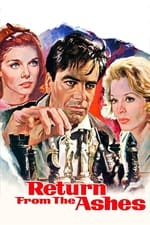Personal Info
Known For Writing
Known Credits 6
Gender Male
Birthday July 10, 1928
Day of Death May 12, 2019 (90 years old)
Place of Birth Paris, France
Also Known As
- -
Content Score
100
Yes! Looking good!
Login to report an issue
Biography
Hubert Monteilhet (July 10, 1928 - May 12, 2019) was a French writer of crime and historical fiction. His best-known novels are The Praying Mantises and Return from the Ashes which have been adapted into TV and motion pictures. His works are characterized by their literary sophistication and mordant wit while exploring moral and philosophical issues. He was called "one of the more eclectic and diversified dabblers in crime" and "the most literary of all the French crime novelists." Born to a family of a magistrate, Monteilhet was educated by the Jesuits at Saint-Louis-de-Gonzague, a private Catholic school in Paris. During the Occupation, he lived in Auvergne at the family estate in Nouara, near Ambert. He was tutored by Jean Recanati, a communist and future editor of L’Humanité, whom Monteilhet’s parents had taken in. After the war, Monteilhet received his degree in history at the Sorbonne. He first taught history in Normandy, and then at the Lycée Carnot in Tunisia from 1959 to 1970.
Monteilhet’s debut novel, The Praying Mantises, was an instant success. It became the winner of the 1960 Grand Prix de Littérature Policière in France and received Simon & Schuster's Inner Sanctum Mystery Award for 1962. In the crime novels that followed -- Return from the Ashes, The Road to Hell, Prisoner of Love and others — he established himself as a master of psychological suspense with a very personal style, showing great imagination in his choice of themes and plot twists.
In the 1976 novel Sophie ou les Galanteries exemplaires, for the first time, Monteilhet set his story in a distant past – the 18th century. In 1981, he briefly ventured into the science fiction genre with Les Queues de Kallinaos, both a philosophical tale in the style of Pierre Boulle and a tragedy of paternal love pushed to extremes.
Beginning from the 1980s, Monteilhet dedicated himself mostly to historical fiction. He covered a vast array of subjects: the Spanish Inquisition in Les Derniers Feux (1982), Emperor Nero’s Rome in Néropolis (1984), Joan of Arc in La Pucelle (1988), the times of Louis XIII and the Musketeers in De plume et d'épée (1999), and the French Revolution in Les Bouffons (2004).
He continued writing crime novels from time to time: Le Procès Filippi (1981), La Perte de Vue (1986), Arnaques (2006) and others.
For many years, Monteilhet was a food columnist for the regional newspaper Sud Ouest Dimanche.
He explored his gastronomic preoccupations in the witty crime thrillers La Part des anges (1992), Œdipe en Médoc (1993), Étoiles filantes (1994), and Le Taureau par les cornes (1994). His last novel, Une vengeance d'hiver, was published in 2012. In 2015, he also wrote the non-fiction book Intox: 1870-1914, la presse française en délire.
Monteilhet died on May 12, 2019, in Garlin, a small town in southwestern France, where he resided for many years. He is survived by his wife Geneviève, five children, 12 grandchildren, and seven great grandchildren.
Source: Article "Hubert Monteilhet" from Wikipedia in English, licensed under CC-BY-SA 3.0.
Hubert Monteilhet (July 10, 1928 - May 12, 2019) was a French writer of crime and historical fiction. His best-known novels are The Praying Mantises and Return from the Ashes which have been adapted into TV and motion pictures. His works are characterized by their literary sophistication and mordant wit while exploring moral and philosophical issues. He was called "one of the more eclectic and diversified dabblers in crime" and "the most literary of all the French crime novelists." Born to a family of a magistrate, Monteilhet was educated by the Jesuits at Saint-Louis-de-Gonzague, a private Catholic school in Paris. During the Occupation, he lived in Auvergne at the family estate in Nouara, near Ambert. He was tutored by Jean Recanati, a communist and future editor of L’Humanité, whom Monteilhet’s parents had taken in. After the war, Monteilhet received his degree in history at the Sorbonne. He first taught history in Normandy, and then at the Lycée Carnot in Tunisia from 1959 to 1970.
Monteilhet’s debut novel, The Praying Mantises, was an instant success. It became the winner of the 1960 Grand Prix de Littérature Policière in France and received Simon & Schuster's Inner Sanctum Mystery Award for 1962. In the crime novels that followed -- Return from the Ashes, The Road to Hell, Prisoner of Love and others — he established himself as a master of psychological suspense with a very personal style, showing great imagination in his choice of themes and plot twists.
In the 1976 novel Sophie ou les Galanteries exemplaires, for the first time, Monteilhet set his story in a distant past – the 18th century. In 1981, he briefly ventured into the science fiction genre with Les Queues de Kallinaos, both a philosophical tale in the style of Pierre Boulle and a tragedy of paternal love pushed to extremes.
Beginning from the 1980s, Monteilhet dedicated himself mostly to historical fiction. He covered a vast array of subjects: the Spanish Inquisition in Les Derniers Feux (1982), Emperor Nero’s Rome in Néropolis (1984), Joan of Arc in La Pucelle (1988), the times of Louis XIII and the Musketeers in De plume et d'épée (1999), and the French Revolution in Les Bouffons (2004).
He continued writing crime novels from time to time: Le Procès Filippi (1981), La Perte de Vue (1986), Arnaques (2006) and others.
For many years, Monteilhet was a food columnist for the regional newspaper Sud Ouest Dimanche.
He explored his gastronomic preoccupations in the witty crime thrillers La Part des anges (1992), Œdipe en Médoc (1993), Étoiles filantes (1994), and Le Taureau par les cornes (1994). His last novel, Une vengeance d'hiver, was published in 2012. In 2015, he also wrote the non-fiction book Intox: 1870-1914, la presse française en délire.
Monteilhet died on May 12, 2019, in Garlin, a small town in southwestern France, where he resided for many years. He is survived by his wife Geneviève, five children, 12 grandchildren, and seven great grandchildren.
Source: Article "Hubert Monteilhet" from Wikipedia in English, licensed under CC-BY-SA 3.0.
Writing
|
||||||
|
||||||
|
||||||
|
Acting
|





